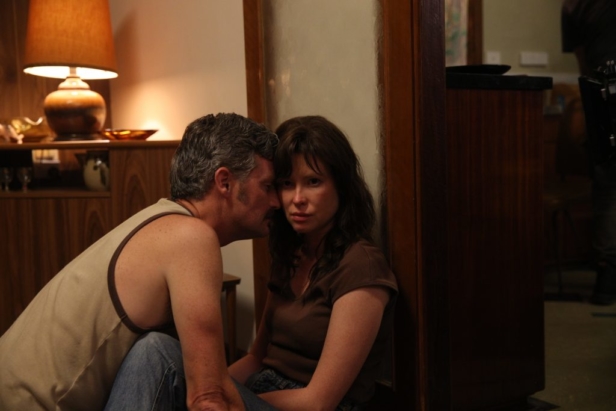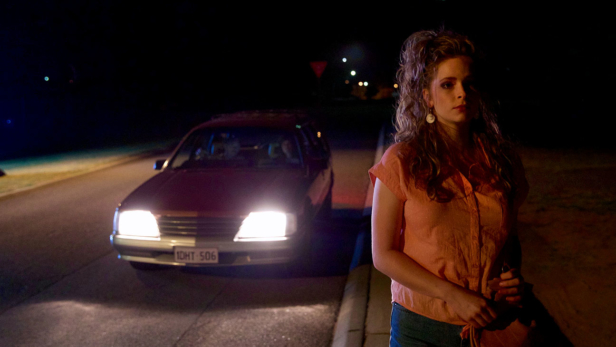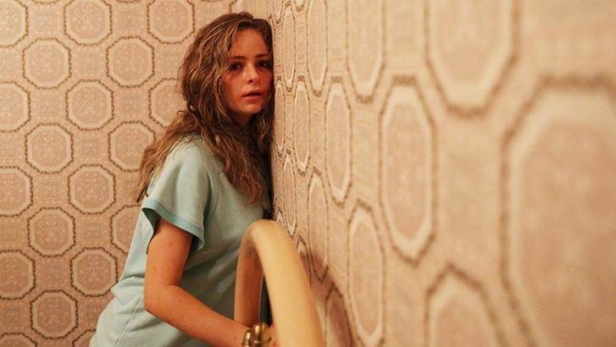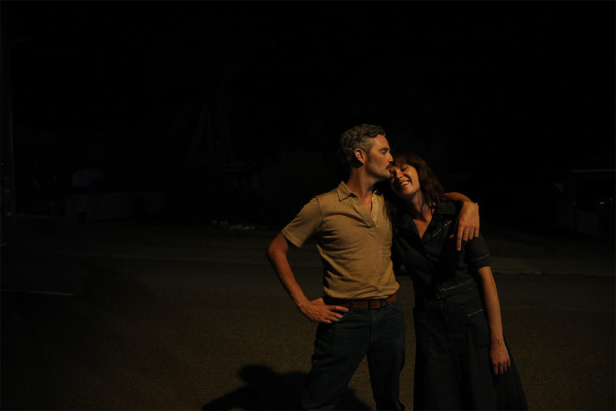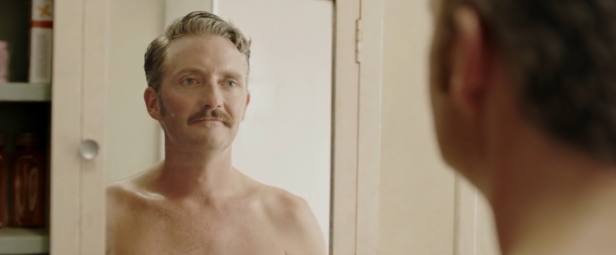There’s been a lot of buzz building around Ben Young’s feature debut Hounds Of Love since it debuted at the Venice Film Festival last year. Inspired by, rather than based on, true events, it’s a highly accomplished and impressively restrained piece of psychological horror set in 1987 Perth that follows Vicki Malone (Ashleigh Cummings), a teenage girl who’s kidnapped by serial murderers John and Evelyn White (Stephen Curry and Emma Booth).
As Vicky is trapped in this couple’s sick nightmare, the film not only shows us the psychology of the victim, but of the woman who’s been drawn to this monstrous murderer, as well as the frantic mother searching for her missing girl. It’s incredibly difficult to watch, but it’s surprisingly sensitive too, and we talked to the writer-director about what drew him to this material, the importance of having trust with your actors, and how he’s found the reaction to the film so far.
Where did this story come from?
My mum writes crime fiction, and I was just over at her place one day and she had all these books on the kitchen table all about true serial killing crimes, and there was one on there which specialised on women who kill. That was interesting to me because I didn’t know much about it, so just for my own morbid curiosity I decided to read the book, and it was fascinating because it really got into the psychology of why women commit murder.
Obviously there’s a whole realm of reasons and no two reasons are exactly the same, but there are a remarkable amount of similarities, particularly women who commit serial murder. So I did some more research and I discovered the very real and unfortunate phenomenon of couples that kill. I found nine cases of couples who’d committed serial murder together and often the circumstances and the relationship between the perpetrators was very similar.
Why did you decide not to tell a true-crime story and explicitly base it on real events?
I think it’s just because with all of the real life serial killers that I found, there just was no redeeming qualities in them in my opinion, and I didn’t want to be completely black and white and say “This person is completely bad and this person is a victim.” I wanted to try and blur the lines a little bit, so I thought it would have been disrespectful to do that with a real case.
Also, I didn’t really like the idea of giving specific serial killers more notoriety by throwing their name around. And I also like the freedom that I had by not having to stick to any particular story. Because real life doesn’t work like movies. In movies, characters have to have arcs and I couldn’t find anything like that in any of the true cases that I read about.
The film is essentially the story of three women, it’s not just focused on the victim. How did that come about?
It was all sort of an accident. When I first started writing it, I thought it was going to be Vicki’s story but it became really tough to have an active protagonist when she’s chained to a bed for 80% of the story, so I realised I needed her to have more to do with these villains.
So it just seemed like the right thing to do was to involve her with the female perpetrator, and for that they needed common ground. So Susie Porter’s character, Vicki’s mother in the film, wasn’t in the earlier drafts but then I realised that motherhood was something that was coming up more and more in dialogue and scenes that I was writing between Evelyn and Vicki, so I thought that it would be interesting to explore Vicki’s relationship with her own mother a little bit more.
Was it always the plan to have most of the violence occur off-screen?
Almost as a challenge to myself I decided that I didn’t want to make a very violent film, because we’ve seen that so much. I find myself seeking out thrillers most of the time and nowadays most of what I watch which is labelled as a thriller is just gore-nography and there’s no tension in it, it’s just very graphic images on the screen. You just don’t care because you become desensitised to it but also they spend so much time working on the violence that they don’t spend enough time working on the characters, so I started to think, “What are some of the films that I find the most tense?” and a few came to my mind and I realised that these films weren’t that violent.
If you think of a movie like The Silence Of The Lambs, there’s three scenes of violence in the entire film, all of the violence is implied, and I think that makes it so much scarier because they spend the time with the characters and it makes it seem so much more believable. I wanted to make a film about the psychology of the people who committed these crimes rather than the crimes themselves. So that’s why I decided to keep the violence off-screen.
It definitely seems to be one where people think they’ve seen more than they have…
Yeah, particularly when the film first played in Venice and someone said “Oh God, how did you deal with all that blood, was it a horrible shoot with all that?” I said “There’s only one scene with blood in it,” and they stopped and I could just see them realising. They said “Oh yeah!” And I was with them on the spot when they realised how little violence there was in the film!
What was the process like of working with the actors on this? I imagine there has to be a lot of trust involved.
I think trust, without a doubt, is the most important element in filmmaking. Because as a director you’re asking so much of actors. I think a lot of people don’t really understand how difficult the craft of acting is. They have to do this incredibly emotional stuff over and over again and I think there’s always that fear that they’re not being good and you’re going to make a fool of them, and it’s their face that’s going to be giant on screen. Trust was so important in this film and I’m really lucky.
Emma Booth who plays Evelyn has been a very dear friend of mine since 2002, we were both actors in a TV commercial together when we were 13 years old. That helped a lot and she’d done a series with Stephen Curry called Cloudstreet where they played father and daughter. I think it was easy to get Steve’s trust because Emma had such trust in me already.
Ashleigh was the new kid on the block, she was the last one cast and we didn’t even cast her until we were a week into pre-production, Steve and Emma were already here. So she came and I did a lot of work with her and the three of us just hung out and got to know each other, and I made it really clear what I was trying to get out of each scene. I just said to them, “Look, this is what I want to get out of the scene, this is what it involves, it’s just a film, it’s not worth any of us damaging ourselves psychologically by doing it, so if there’s something that I’m asking you to do in this film that you’re really uncomfortable doing just let me know. Now you know the point, why I think that should be in the film, maybe you can help me identify another way of getting that same point across.”
And there were a couple of times where that happened, and I could really tell that the actors appreciated my understanding of their welfare, and that helped a lot. There were other bits where the actors were like, “I don’t want to do that but it is important for the story and I believe in the story and I’m going to give it my all,” and they did!
How was it actually getting it all shot?
Oh, it was horrible! It was a 20-day shoot, which is just nothing, and it was in the middle of summer and it was all location based. There were no sets; everything that you saw was real. And obviously it was a period film, it’s set in 1987, so we were in a very old house and we shot it in the middle of summer in Perth, and we had five days in a row where it was 45 degrees Celsius. It was so, so tough, and after every take the actors’ faces would melt because they all had so much make up on so it was a very, very gruelling process.
What were the reasons for setting it in 1987?
There were a few. Perth, where I’m from and where the film is set, it really boomed in the 80s, the America’s Cup came to Australia and it really put us on the map globally. There was a lot of money injected so there was a lot of new infrastructure and things built and a lot of new suburbs were developed in that time. And they’re all still there. They haven’t changed.
We had virtually no money to make this film and there are so many films that get made, particularly in this kind of genre, that I needed to try and think of ways to make it stand out a little bit, and I realised that there are whole pockets of Perth that still look exactly like they did in the 80s. So by setting it in that period it was a very cheap way for us to come up with an aesthetic that was probably going to be a bit different.
The other reason was music. It gave me an excuse to come up with what I think is a pretty good and interesting soundtrack, which again is different to a lot of other films in this genre which are coming out now, and the same with costumes, they’re all 80s costumes, and they’re not the cool costumes, they’re cheap. We dressed everybody for virtually nothing, just with stuff that we found in OpShops. And not trendyOpShops, just the stuff that no one wanted anymore and so it was a very cheap way of giving the film an aesthetic and a time. And the other reason is my own laziness as a screenwriter, it would almost be impossible to tell this kind of story now with social media and mobile phones and all that kind of thing!
There have been a lot of comparisons to Snowtown and I think a lot of that is due to that feeling of helplessness, that the police aren’t coming to the rescue. Was that something you were familiar with?
Yeah, I think so. I do remember, I grew up in the 80s in Perth and there was that kind of feeling. I was deeply traumatised by a true crime that took place in 1991 in Western Australia that to this day has never been solved and it’s been something that I’ve never forgotten. I was only 11 years old at the time and I just couldn’t understand how the police couldn’t catch the person who was doing this. And we had another serial killer in Western Australia who was active in 1997 who no one found either, they made an arrest earlier this year and he still hasn’t gone to trial.
But there was this sense that murder was something that you could get away with. And because the country is so large, people go missing and they never get found. So it’s definitely a fear that I felt growing up.
How have you found the reaction to the film?
It’s been a bit weird for me because I went to Venice with the film and we only finished it a week before it screened. So I didn’t even know that it had been entered into Venice, it was entered by our sales agent and then we got in and that was a complete shock to me. That was so humbling because I never expected the film to play to an international audience. I thought it would only play in Australia where very few people would see it. I was in the very fortunate position of getting a great agent and a manager out of that, and as a result of that I got swept off into LA and thrown a whole bunch of projects and less than a year after shooting Hounds Of Love I was in pre-production on a big American film [Extinction, starring Lizzy Caplan and Michael Peña].
I went to the Busan film festival in South Korea, and those are the only places I’ve been with it. We had no walkouts in Busan, we had a whole bunch in Venice. I think that was partly in Venice because no one knew anything about the film, they had a brief synopsis and knew that it was Australian and that it was made by a first time director with Australian actors who no one had heard of internationally. So they went but no one who had seen it had read a review, and maybe they went because it was the premiere…but from what I’ve heard from the actors who’ve travelled with the film internationally, they said that there have been fewer walkouts because people are aware of what they’re seeing. There’s been more press about it.
Is it odd seeing your film go off to festivals without you?
I think it’s been good for me because making a film that was received the way Hounds Of Love was received is truly life changing. My life changed overnight, after the premiere in Venice I woke up and had 91 missed phone calls! I had like 700 Facebook notifications and I was like “What is going on, this is just insane!” And I think that immediate attention that you get, it could be very easy to get sucked into it and forget why you decided to make movies in the first place, and it wasn’t for the attention, it’s because you love the process and you love storytelling and you love collaborating with people. I think that I’m really lucky that I got to miss a lot of the result because you don’t do it to walk down red carpets and get patted on the back and get free booze and things like that, you do it because you love storytelling, so for me I think it’s been good to have that distance.
Finally, which films were most important to you growing up?
There’s so many of them. The first film that I got obsessed with was Star Wars: A New Hope, I saw it so many times and I was of the age where all the action figures were around and I used to make stop motion movies with all of my action figures from Star Wars. I just wanted to be a part of Star Wars and wanted to make stories like that. Indiana Jones was huge for me, and quite strangely really, The Princess Bride was a film that I was just obsessed with. I watched it so many times that I knew every word by heart. So yeah they’re all very different films to Hounds Of Love but then as I got older I got more interested in the darker stuff and I became fascinated with how movies could make you feel, so when I became older I got obsessed with Fargo. That was probably one of the most influential films on me, and The Silence Of The Lambs.
Hounds Of Love is released in UK cinemas on 28 July. Keep up with the latest genre news with the new issue of SciFiNow.
